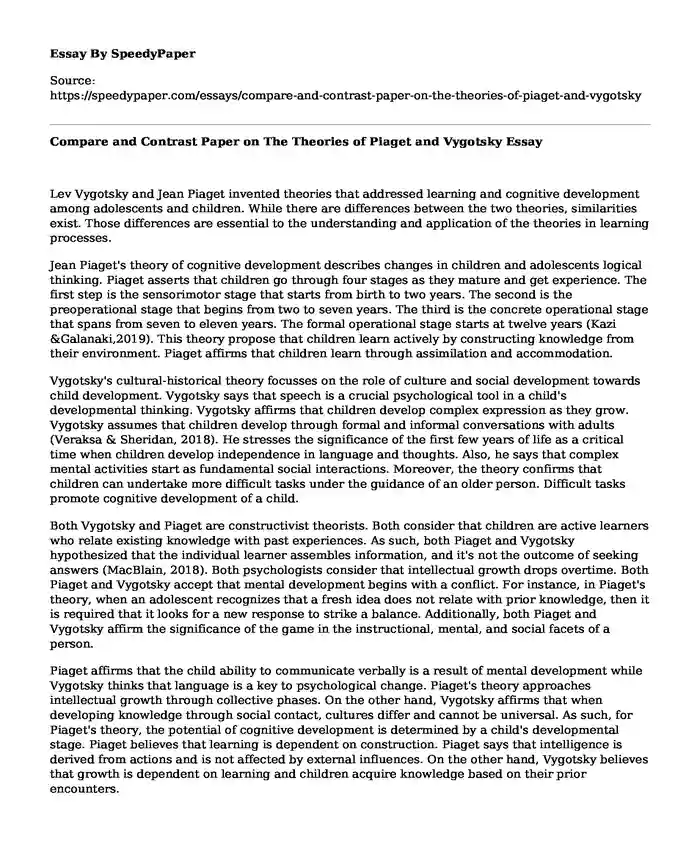
| Essay type: | Compare and contrast |
| Categories: | Personal development |
| Pages: | 3 |
| Wordcount: | 614 words |
Lev Vygotsky and Jean Piaget invented theories that addressed learning and cognitive development among adolescents and children. While there are differences between the two theories, similarities exist. Those differences are essential to the understanding and application of the theories in learning processes.
Jean Piaget's theory of cognitive development describes changes in children and adolescents logical thinking. Piaget asserts that children go through four stages as they mature and get experience. The first step is the sensorimotor stage that starts from birth to two years. The second is the preoperational stage that begins from two to seven years. The third is the concrete operational stage that spans from seven to eleven years. The formal operational stage starts at twelve years (Kazi &Galanaki,2019). This theory propose that children learn actively by constructing knowledge from their environment. Piaget affirms that children learn through assimilation and accommodation.
Vygotsky's cultural-historical theory focusses on the role of culture and social development towards child development. Vygotsky says that speech is a crucial psychological tool in a child's developmental thinking. Vygotsky affirms that children develop complex expression as they grow. Vygotsky assumes that children develop through formal and informal conversations with adults (Veraksa & Sheridan, 2018). He stresses the significance of the first few years of life as a critical time when children develop independence in language and thoughts. Also, he says that complex mental activities start as fundamental social interactions. Moreover, the theory confirms that children can undertake more difficult tasks under the guidance of an older person. Difficult tasks promote cognitive development of a child.
Both Vygotsky and Piaget are constructivist theorists. Both consider that children are active learners who relate existing knowledge with past experiences. As such, both Piaget and Vygotsky hypothesized that the individual learner assembles information, and it's not the outcome of seeking answers (MacBlain, 2018). Both psychologists consider that intellectual growth drops overtime. Both Piaget and Vygotsky accept that mental development begins with a conflict. For instance, in Piaget's theory, when an adolescent recognizes that a fresh idea does not relate with prior knowledge, then it is required that it looks for a new response to strike a balance. Additionally, both Piaget and Vygotsky affirm the significance of the game in the instructional, mental, and social facets of a person.
Piaget affirms that the child ability to communicate verbally is a result of mental development while Vygotsky thinks that language is a key to psychological change. Piaget's theory approaches intellectual growth through collective phases. On the other hand, Vygotsky affirms that when developing knowledge through social contact, cultures differ and cannot be universal. As such, for Piaget's theory, the potential of cognitive development is determined by a child's developmental stage. Piaget believes that learning is dependent on construction. Piaget says that intelligence is derived from actions and is not affected by external influences. On the other hand, Vygotsky believes that growth is dependent on learning and children acquire knowledge based on their prior encounters.
Piaget and Vygotsky's theories have greatly influenced learning and teaching methods. Although they may vary on some parts of their hypothetical suggestions, both offer instructors and educationalists proper endorsements on how to optimize learning among children. Both theorists suggest invaluable clarifications about how learning takes place and cognitive growth at the initial stages of child growth. Both are constructivist theories and focus on how children acquire knowledge from their prior experiences.
References
Kazi, S., & Galanaki, E. (2019). Piagetian Theory of Cognitive Development. The Encyclopedia of Child and Adolescent Development, 1-11. https://doi.org/10.1002/9781119171492.wecad364
MacBlain, S. (2018). Learning Theories for The Early Years of Practice. SAGE.
Veraksa, N., & Sheridan, S. (2018). Vygotsky's Theory in Early Childhood Education and Research. New York, NY: Routledge.
Cite this page
Compare and Contrast Paper on The Theories of Piaget and Vygotsky. (2023, Apr 01). Retrieved from https://speedypaper.com/essays/compare-and-contrast-paper-on-the-theories-of-piaget-and-vygotsky
Request Removal
If you are the original author of this essay and no longer wish to have it published on the SpeedyPaper website, please click below to request its removal:
- Free Essay Example: Local Knowledge Methodology vs Scientific Knowledge
- Free Essay: Investigating the Flood Protection Systems during Hurricane Katrina
- Essay Sample on Gentrification in Jackson Heights, Queens NY
- Management Essay Sample: Reflective Journal on Implementation Strategy
- Why Lack of Literacy Is a Problem - Cause and Effect Essay
- Free Essay Sample: High-Value Care
- Paper Example. Anatomy and Physiology
Popular categories




